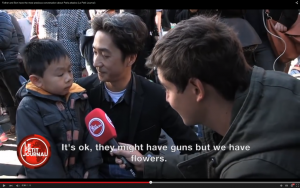From commuovere to komorebi…
By way of an end of year sign-off, recommended reading for the new year: the delightful Lost In Translation, An Illustrated Compendium of Untranslatable Words from Around the World. It’s a treasure trove of lovable language – from commuovere (to be moved to tears by a story) to komorebi (the sunlight that filters through the leaves of the trees).
As author Ella Frances Sanders says in her introduction: “In our highly connected and communicative world, we have more ways than ever to express ourselves, to tell others how we feel, and to explain the importance or insignificance of our days. The speed and frequency of our exchanges leave just enough room for misunderstandings, though, and now perhaps more than ever before, what we actually mean to say gets lost in translation. The ability to communicate more frequently and faster hasn’t eliminated the potential for leaving gaps between meaning and interpretation, and emotions and intentions are misread all too often. The words in this book may be answers to questions you didn’t even know to ask, and perhaps some you did. They might pinpoint emotions and experiences that seemed elusive and indescribable, or they may cause you to remember a person you’d long forgotten. If you take something away from this book other than some brilliant conversation starters, let it be the realisation (or affirmation) that you are human, that you are fundamentally, intrinsically bound to every single person on the planet with language and with feelings. As much as we like to differentiate ourselves, to feel like individuals and rave on about expression and freedom and the experiences that are unique to each one of us, we are all made of the same stuff. We laugh and cry in much the same way, we learn words and then forget them, we meet people from places and cultures different from our own and yet somehow we understand the lives they are living. Language wraps its understanding and punctuation around us all, tempting us to cross boundaries and helping us to comprehend the impossibly difficult questions that life relentlessly throws at us.”
Wishing you a happy and prosperous 2016, one and all.

